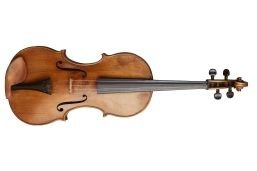
The American Viola Society |
The American Viola Research Society was founded in 1971 by Myron Rosenblum. As a nonprofit organization, today's AVS has a lot of initiatives that are constantly evolving.
Elizabeth Turner – The American Viola Society (AVS) is a nonprofit organization of viola enthusiasts, including students, performers, teachers, scholars, composers, makers, and friends, who seek to encourage excellence in performance, pedagogy, research, composition, and lutherie by fostering communication and friendship among violists of all skill levels, ages, nationalities, and backgrounds.
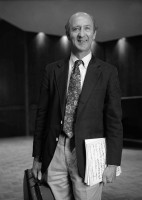
In 1971 the American Viola Research Society was founded by Myron Rosenblum. The organization changed its name in 1978 to the American Viola Society (AVS) to better reflect the interests of its members. In 1979 David Dalton founded the Primrose International Viola Competition (PIVC) in honor of the great Scottish-American violist William Primrose. In 1981 the Primrose International Viola Archive (PIVA), the official archive of the AVS, was established at Brigham Young University. The AVS newsletter expanded in scope, becoming the Journal of the American Viola Society (JAVS) in 1985. Since that time, the JAVS has served as a leading source of viola research.
Michael A. Palumbo, president of AVS, was a college professor for 42 years, conducting, teaching, and performing, prior to his retirement in 2013. He was a member of the faculty string quartet, and also an active soloist. In 2015 Palumbo retired from his position as principal violist of the Ballet West Orchestra. His life now is split between the AVS, conducting Chamber Orchestra Ogden, which he founded in 2011, and performing chamber music with NextEnsemble.
Michael Palumbo talks about his organization, career in music, and what it takes to become a professional violist today.
What are your members asking for the most within your organization?
Our members ask for a variety of things, but some of the most common are help with teaching and information on new music. We have a very active Facebook page at https://www.facebook.com/groups(americanviola/
What style of music or background do most of your members draw from, is it primarily Classical? Or Jazz, Bluegrass, Contemporary?
While the majority of our members tend to be primarily classically oriented many, such as myself, are into other styles of performing, from rock to jazz, and everything in between.
What are some neat things your members are currently up too?
Our members are always performing recitals, soloing with orchestras, playing chamber music, working with their local viola organizations, and writing music for the viola.
Where would you like to see a Local chapter established?
The AVS no longer has chapters. Rather, there are individual viola organizations around the country that are our partners in the viola.
What are some other opportunities members can either volunteer, or donate their time towards within the organization?
The AVS is run completely by a volunteer board of directors. There is always a need for volunteers to help with a number of our committees, and ongoing initiatives.
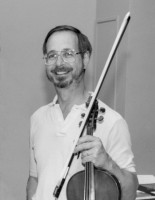
How have you been able to balance a career in the arts? As a performer, educator, and conductor?
I was a college professor for 42 years, conducting, teaching, and performing, prior to my retirement in 2013. Admittedly it was sometimes a challenge to find the time to keep up my performance skills, but, like any person in my position, I simply had to carve out the practice time necessary to be able to play. I was a member of the faculty string quartet, and also an active soloist. In 2015 I retired from my position as principal violist of the Ballet West Orchestra. My life now is split between the AVS, conducting Chamber Orchestra Ogden, which is an orchestra I founded in 2011, and performing chamber music with NextEnsemble, a group of local professional musicians that performs a variety of different types of music.
How easy is it today to become a professional violist? What are some of today’s challenges? What should violists be prepared for in the industry?
Getting into the professional performing field is probably harder today than it was when I played my first professional gig in 1970. The players are better, and there are more young “whiz kids” than earlier.
There are a number of challenges to getting into the profession, including the fact that there are more people seeking jobs in a job pool that isn’t really expanding. Making a living as a professional violist is harder now.
A violist planning on a career as a performer should realize that it takes a huge commitment to practicing, being willing to travel and spend a fair amount of money to take auditions, some of which could end up being thirty seconds long, and also realize that there will be a lot of people at every audition, seeking the same spot.
What advice do you give to young performers?
Be familiar with contemporary and always evolving playing techniques, and their specific notation. Get involved in your orchestra’s players organization. Join the American Federation of Musicians, the AFM works for performing musicians.
Which Viola players, and composers are you currently listening too?
I’m always listening to a variety of music, new and old. The same with players, lots of different ones, all of whom have special strengths. I just returned from Prague and Italy, and while in Prague I purchased two CDs at the Smetana Museum. They are of Jan Peruska, a violist with whom I’m not familiar. He is playing some concertos that aren’t often recorded, and collaborating with the Czech Philharmonic Orchestra. I’m looking forward to listening to these soon.
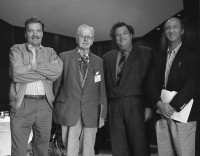
(from left to right): David Dalton,
Maurice Riley, Alan deVeritch,
Myron Rosenblum
What have you brought to AVS specifically, and what have you learned personally by having the role of President?
I am following a long a distinguished lineage of AVS presidents, each of whom has brought various strengths to the Society. I’m not sure that I can list a particular strength that I have brought, but I guess I would have to say that I have a lot of energy to devote to the organization and the position of president. I’m also a fairly organized person, and I think that this is a very necessary strength for anyone to have in order to keep track of all of the various things that the AVS is doing.
In the year and one-half that I have been president I have learned what an incredible group of people I get to work with, especially those who serve on the Executive Board. These are all busy teachers and or performers who take on the many tasks that are necessary to insure the smooth operation of the AVS.
Is Viola music fading away in 2018, or re-evolving?
Viola music is definitely not fading away. While the music of the old masters is still as vital as ever, it is being augmented with many great contemporary works. More mainstream composers than ever before are writing for the viola, in all performance genres, and with the many great performers on the scene today I don’t see the demand for new viola compositions slowing.
Thank you very much for your time and the insightful interview, Michael!
Useful links:

This blog article was written by
Elizabeth Turner. NewYork, NY, USA
» Website of Elizabeth Turner
Fotos: Dwight Pounds
» here you can find our sheet music donloads
NEW and available as download:
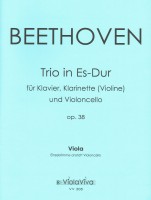
(1770-1827)
Piano Trio in E flat major
op. 38, single part for Viola (instead of Cello
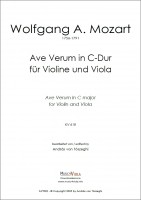
(1756-1791)
Ave Verum in C major
KV 618
for Violin and Viola
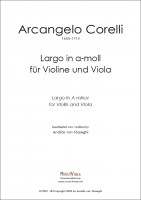
(1653-1713)
Largo in A minor
op. 5, No. 8 for Violin
and ViolaFREE OF CHARGE
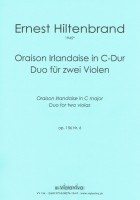
(1945)
Oraison Irlandaise
Duo, op. 156, No. 6
for two Violas
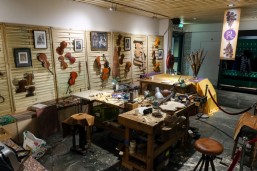
Building a viola in only 4 days
In November 2018 the International Viola Congress (IVC) took place in Rotterdam, Holland. During these four days four string instrument makers built a viola together. We were there and reported live.
» to the blog post
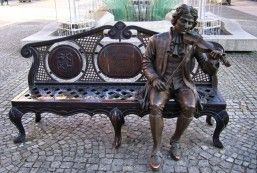
Georg Philipp Telemann was one of the most important composers of the Baroque period. He contributed innovative impulses to the development of music and significantly changed the musical world of the early 18th century.
» to the blog post
Hermann Ritter and his viola alta
Hermann Ritter, now generally quite forgotten, was actually one of the most respected and influential personalities in the history of the viola. Lionel Tertis is considered the first viola soloist. But that's not true...
» to the blog post
|
Viola news letter |
 Do you don't want to miss any news regarding viola anymore? Our monthly viola news letter will keep you informed.
Do you don't want to miss any news regarding viola anymore? Our monthly viola news letter will keep you informed.» Subscribe to our viola letter for free
|
|
 Visit and like us on Facebook.
Visit and like us on Facebook.» Music4Viola on Facebook
